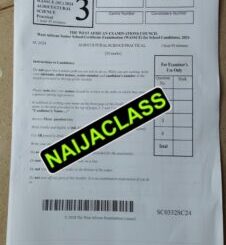Welcome to “Naijaclass Academy” For Waec Literature Prose & Objective 2024 Expo Answer

Date: Friday, 17th May, 2024
Literature-In-English (Prose & Objective) 9:30 am – 11:45 am
——————————
LITERATURE-OBJ
1-10 ABDDCADBAC
11-20 DBDADABAAB
21-30 DCCAABCDBA
31-40 DADBDDBAAC
41-50 BACCBCBDCA
=========================================
=========================================
(NUMBER 1 VERSION 1)
(1)
In the novel Second Class Citizen, conflict is portrayed through the tumultuous marriage between Adah and Francis, revealing a relationship founded on selfish motives rather than mutual support and love. Adah is driven by a desire to work hard and contribute financially to her family, while Francis seeks to parasitically benefit from Adah’s efforts without reciprocating.
Adah’s dissatisfaction with her mother’s remarriage, which she perceives as a betrayal of her late father, exacerbates her sense of obligation to financially support her family. She dreams of marrying a wealthy man who would allow her mother and brother to live with her, thus solving many of her problems. However, the suitors she encounters are much older, and she cannot accept a marriage where she would be treated as a servant and have to refer to her husband as “Sir” even behind his back. In the Ibuza community from which Adah hails, marriage is viewed as a master-servant relationship where the woman is expected to serve the man, bear many children, and care for them with little or no assistance from the father. This patriarchal mindset deems the education of a girl-child unnecessary, believing it makes women arrogant and irresponsible. Consequently, Adah is not enrolled in school at a young age, even though her brother, Boy, is already attending school.
Despite these societal pressures, Adah marries Francis, a young man studying to become an accountant. Francis is impoverished and cannot afford the five hundred pounds bride price that Adah’s family demands, given her college education, despite none of them contributing to her schooling. Adah’s family refuses to attend the wedding due to this unpaid bride price.
While it cannot be said that Adah and Francis’s union is entirely devoid of love, Francis’s actions and inactions reveal a parasitic relationship rather than a symbiotic one. Adah’s hard work, passion for the family, and substantial salary sustain their marriage, as Francis refuses to find employment to support the family. He does nothing to promote the family’s well-being and frequently writes home to his parents about issues that could be resolved between him and Adah, such as when Adah obtains a family-planning method without his consent.
To Francis, a woman in marriage is a second-class human being, expected to be available for sex at any time, bear numerous children, and face physical abuse if she refuses. Women are to wash clothes, have meals ready at all times, and are deemed incapable of intelligent conversation. Francis dismisses Adah’s aspirations of becoming a writer, fearing his family’s disapproval if his wife were to publish a book.
Adah, despite being the breadwinner, faces maltreatment, beatings, assaults, insults, abandonment, and rejection. Francis neglects their children, ultimately rejecting them in court and expressing indifference about their adoption. The loveless nature of their marriage, as seen through Adah’s perspective, stems from Francis’s refusal to care for and respect the family. Adah resolves to raise her five children on her own, pledging never to let them down. She declares, “The children are mine, and that is enough. I shall never let them down as long as I live,” signaling her determination and resilience in the face of Francis’s abandonment.
It portrays conflict through the deeply flawed marriage of Adah and Francis, highlighting issues of gender inequality, societal expectations, and the struggle for personal independence and dignity within oppressive structures.
=======================
(2)
The relationship between Adah and Bill in “Second Class Citizen” is a complex portrayal of gender dynamics, societal expectations, and individual resilience. As the protagonist of the novel, Adah navigates the challenges of being a Nigerian immigrant woman in London, while also contending with the unsupportive and domineering presence of her husband, Bill.
From the outset of the novel, it is evident that Adah and Bill’s relationship is fraught with tension and imbalance. Adah, depicted as a resilient and ambitious woman, strives to pursue her dreams of education and self-fulfillment despite the societal barriers she faces as an immigrant woman of color. However, Bill, her husband, represents the patriarchal norms and expectations that seek to confine Adah to traditional gender roles and limit her aspirations.
Throughout the narrative, Bill’s character serves as a stark contrast to Adah’s resilience and determination. He consistently undermines her efforts, belittles her achievements, and exerts control over her life, reinforcing the societal expectations of women’s subservience and domesticity. Despite Adah’s desires for independence and self-actualization, Bill’s domineering presence serves as a constant obstacle to her pursuit of happiness and fulfillment.
The dynamics of Adah and Bill’s relationship reflect larger themes of gender inequality and societal oppression present in both Nigerian and British cultures. Adah’s struggles to assert her agency and autonomy within the confines of her marriage underscore the broader challenges faced by women in patriarchal societies, where their worth and potential are often overlooked and undervalued.
However, despite the obstacles posed by Bill’s unsupportive behavior, Adah emerges as a resilient and determined protagonist who refuses to be defined by societal expectations or constrained by her circumstances. Her unwavering commitment to her dreams and aspirations serves as a testament to the strength of the human spirit and the power of individual resilience in the face of adversity.
===========================================
*(NUMBER 4 VERSION 1)*
(4)
Nii’s rejection of Linda’s advances is portrayed through several pivotal points that emphasize his moral integrity, sense of loyalty, and the pressures he faces. Linda persistently tries to convince Nii to travel to Lagos with her, exploiting his difficult situation at home. Despite her relentless efforts, Nii begins to understand her ulterior motive. She offers herself to him as an incentive, revealing her willingness to exploit his vulnerability. Linda’s explicit offer, “I will let you have me for free here and in Lagos, too… I know your wife is sick, quite sick and has not been well for a long time”, underscores her manipulative intentions.
Nii is taken aback by Linda’s lewd proposition. He grapples with the moral dilemma she presents, likening it to the biblical temptation of Joseph. As he tries to discern her true intentions, Linda reveals her need for a British Visa to join her husband in London, a visa she cannot obtain in Ghana. This revelation adds complexity to Nii’s predicament, as Linda’s desperation contrasts with his own ethical boundaries and sense of loyalty to his sick wife.
Linda’s desperation becomes clear when she confides that her only opportunity to obtain a British Visa is to go to Nigeria and acquire it there, leveraging Nii’s Nigerian nationality to facilitate her entry. She proposes a deceitful plan for Nii to pose as her husband, which would circumvent bureaucratic obstacles. This plan puts Nii in a tight spot, challenging his integrity and loyalty to his wife and his principles.
Faced with an impossible choice and unable to walk home due to the curfew, Nii devises a clever escape plan. Stripping off his clothes, he puts them in his bag and runs towards the soldiers at the barrier, shouting about the curfew and pretending to be intoxicated. This ruse works, and the soldiers escort him home, admonishing him to respect the law. Nii’s quick thinking not only extricates him from the immediate danger but also symbolizes his rejection of Linda’s unethical proposition and his commitment to uphold his moral values.
Throughout the encounter, Nii’s loyalty to his ailing wife remains steadfast. Despite Linda’s temptations and his own challenging circumstances, Nii does not waver in his commitment to his wife. His refusal to accept Linda’s offer, even when she exploits his wife’s illness to manipulate him, underscores his deep sense of loyalty and ethical integrity. Nii’s actions reflect his unwavering dedication to his wife’s well-being, despite the allure of escaping his own troubles.
Linda employs manipulative tactics, preying on Nii’s vulnerable situation and offering sexual favors to secure her visa. Nii’s resistance to her advances highlights his moral fortitude and his awareness of the ethical implications of her proposal. By rejecting Linda, Nii demonstrates his unwillingness to compromise his values, even in the face of personal hardship and temptation.
Nii’s encounter with Linda also serves as a broader commentary on societal and ethical issues. Linda’s willingness to use deceit and manipulation to achieve her goals reflects societal pressures and moral compromises people are sometimes forced to consider. Nii’s rejection of her advances and his clever escape highlight the importance of maintaining personal integrity and ethical standards, even in difficult circumstances.
Nii’s rejection of Linda’s advances in Unexpected Joy at Dawn is a complex interplay of moral integrity, loyalty, and quick thinking. Nii’s actions underscore his commitment to his wife and his principles, providing a powerful example of ethical steadfastness in the face of temptation and adversity. Through this narrative, the novel explores the themes of loyalty, integrity, and the ethical challenges individuals face, illustrating the profound impact of personal choices on one’s character and relationships.
=========================================
QUESTION 5
The Epilogue of Ralph Ellison’s “Invisible Man” is significant to the structure of the novel in several ways:
1. Reflective Framework: The novel begins with a Prologue that describes the narrator’s living situation in a basement full of light bulbs, and his perspective on his “invisibility.” The Epilogue serves to bring the story full circle, as the narrator reflects on his journey and the lessons he has learned. This circular structure emphasizes the ongoing struggle of the protagonist and the unresolved nature of racial issues in America.
2. Resolution of the Narrator’s Identity Crisis: Throughout the novel, the narrator struggles with his identity and how society perceives him. In the Epilogue, he comes to terms with his invisibility and expresses a desire to rejoin the visible world, suggesting a resolution to his internal conflict and a step towards self-actualization.
3. Clarification of Themes: The Epilogue gives the protagonist an opportunity to discuss the themes of the novel more overtly, such as the complexity of identity, the social invisibility of marginalized groups, and the necessity for societal change. The narrator’s realizations and his intention to tell his story shed light on the importance of narrative and visibility for those who have been oppressed or overlooked by the dominant culture.
4. Call to Social Action: Ellison uses the Epilogue to encourage readers to acknowledge and address the invisible among them. It also acts as a call to action, inspiring readers to examine the ways in which society ignores or misrepresents certain groups, and to work towards a more inclusive and understanding society.
5. Philosophical Insight: The Epilogue allows the narrator to philosophize about his experiences and share the wisdom he has gained. The musings in the final pages resonate with existential themes and encourage readers to ponder the very nature of existence, individuality, society, and the human condition.
6. The Reaffirmation of Narrative: The Epilogue reaffirms the narrator’s decision to tell his story, reinforcing the power of storytelling as a means of reclaiming identity and agency. Ellison underscores the importance of narrative in shaping individual identity and collective understanding.
7. Provides Closure, Yet Opens Dialogue: While the Epilogue brings some closure to the story, it also leaves the door open for interpretation and dialogue. The novel does not end on a definitive note, suggesting that the issues raised by the narrator’s experiences are not definitively resolved, but ongoing matters that require continuous effort and engagement from the audience.
Overall, the Epilogue is an integral part of “Invisible Man,” effectively bookending the novel and providing a poignant conclusion that strengthens the thematic weight of the book and leaves a lasting impact on the reader.
==============================
(6)
The use of blindness as a metaphor in the novel plays a central role in exploring themes of identity, invisibility, and societal indifference. The novel delves into the narrator’s and Tod Clifton’s struggles with conflicting pressures and their uncertainty about their roles in a racially dominated society. This exploration is deeply intertwined with the concept of blindness, which serves as a powerful metaphor for the inability of society to see and acknowledge the true identities and humanity of black individuals.
The narrator’s journey is marked by a search for identity in a society that constantly attempts to define him. As he states at the beginning of the novel, “All my life I had been looking for something, and everywhere I turned something tries to tell me what it was.” This quote encapsulates his struggle to find his place and understand himself amidst external pressures and societal expectations. His blackness is a significant part of his identity, but the societal blindness to his individuality and humanity exacerbates his invisibility.
One key example of this metaphor is the narrator’s experience at the Liberty Paint Plant. Initially, he is hopeful that working there will offer him equality and a sense of belonging with the white workers. However, this hope is quickly shattered as he realizes that the plant is merely another setting where his identity is obscured and exploited. This realization marks the beginning of his endless search for identity, highlighting how societal blindness extends beyond race to encompass any system that refuses to see individuals for who they truly are.
The Brotherhood, a political organization that claims to fight racism and inequality, further illustrates the theme of blindness. The narrator initially believes that the Brotherhood will help him find his identity and provide a systematic way of thinking about the world. He embraces their ideology and structures his identity around it, only to discover that the organization is willing to sacrifice him for its own interests. The Brotherhood’s failure to see the narrator as an individual with his own needs and aspirations, instead of just a tool for their cause, underscores the pervasive blindness within even well-intentioned movements.
Tod Clifton’s fate also exemplifies this metaphor. Clifton’s disillusionment with the Brotherhood and his subsequent tragic end demonstrate how societal blindness and betrayal extend to those who seek to challenge or redefine their roles. Clifton’s decision to leave the Brotherhood and his untimely death reflect the harsh reality faced by those who struggle to assert their identities in a society that refuses to see them.
The theme of invisibility is another aspect of this metaphor. The narrator adopts invisibility as a means of expressing himself in a society that is unsafe for black individuals. He is visible only on the surface, but truly invisible to those around him. This invisibility becomes a shield and a means of survival, allowing him to navigate a hostile world. At the beginning of the novel, he tries to explain his invisibility: “I am an invisible man… I have been surrounded by mirrors of hard and distorted glass. When they approach me, they only see my surroundings. I am not complaining, nor am I protesting either. It is sometimes advantageous to be unseen”. This statement reflects his acceptance of invisibility as a double-edged sword – it provides protection but also perpetuates his marginalization.
The societal blindness to the conditions and identities of black individuals is a critical element of the novel. The white race’s inability to recognize and affirm the humanity of black people renders them “vision-less.” This metaphorical blindness prevents any meaningful recognition or validation of the narrator’s and others’ identities, forcing them into a state of perpetual invisibility. The narrator’s decision to go underground and later resurface signifies his plan to fight back against racial prejudice and cast off his invisibility. His underground retreat symbolizes a period of introspection and preparation for a more assertive and visible existence.
The metaphor of blindness in Invisible Man is integral to understanding the novel’s exploration of identity, invisibility, and societal indifference. It highlights the pervasive inability of society to see and acknowledge the true identities and humanity of black individuals. Through the narrator’s and Clifton’s experiences, Ellison underscores the destructive impact of this blindness and the necessity of confronting and overcoming it to achieve true self-awareness and societal recognition.
==============================================
7. ) Heathcliff harbors hatred towards Hindley Earnshaw because Hindley has mistreated him ever since they were children. This disdain grows over the years due to several reasons:
1. Displacement – Heathcliff is brought into the Earnshaw family as an orphan by Mr. Earnshaw, who finds him on the streets of Liverpool and feels compelled to care for him. Heathcliff receives a lot of affection from Mr. Earnshaw, which makes Hindley, Mr. Earnshaw’s biological son, feel displaced and jealous as Heathcliff seems to usurp the attention and love that Hindley feels is rightfully his.
2. Class Status and Mistreatment – Hindley resents Heathcliff not only for the attention he garners from Mr. Earnshaw but also because Heathcliff’s lower social status is a constant reminder of Hindley’s insecurities regarding his own position and privilege. When Mr. Earnshaw dies and Hindley becomes the master of Wuthering Heights, he uses his power to degrade Heathcliff, forcing him to work as a labourer on the estate and denying him the education and status he had started to acquire under Mr. Earnshaw’s care.
3. Revenge and Cruelty – Heathcliff’s hatred is further fueled by Hindley’s continued cruelty and degradation. Hindley’s mistreatment solidifies Heathcliff’s desire for revenge and deepens the hatred between the two men. Heathcliff vows to gain power over Hindley and eventually manages to do so by gambling with Hindley and accumulating debts against him, effectively gaining control over Wuthering Heights.
4. Romantic Rivalry – While not directly related to Hindley, one can argue that Heathcliff’s hatred towards the entire Earnshaw and Linton families, closely linked to Hindley, is also amplified by his frustrated love for Catherine Earnshaw. Hindley’s actions contribute to the environment in which Heathcliff and Catherine’s relationship becomes untenable, adding another layer of bitterness to Heathcliff’s feelings towards Hindley.
In essence, Heathcliff’s hatred towards Hindley stems from a complex mixture of childhood displacement, social degradation, abuse, and an overarching desire for revenge, all of which transform him into the brooding and vengeful character that drives much of the plot in Emily Brontë’s “Wuthering Heights.”
=======================================
==================
(8) The death of Mr. Earnshaw, the patriarch of Wuthering Heights, marks a significant turning point in the fortunes of Heathcliff, the central character in Emily Brontë’s Wuthering Heights. This explores the profound impact of Mr. Earnshaw’s death on Heathcliff’s life and the subsequent chain of events that unfold as a result.
Firstly, Mr. Earnshaw’s preference for Heathcliff over his biological son, Hindley, creates a rift within the family dynamic. Despite Hindley’s resentment towards Heathcliff, Mr. Earnshaw’s favoritism ensures that Heathcliff enjoys a privileged position within the household. This preferential treatment exacerbates Hindley’s animosity towards Heathcliff, laying the groundwork for future conflicts between the two foster brothers. Mr. Earnshaw’s decision to bring Heathcliff into the family thus sets the stage for the tumultuous events that follow.
Secondly, Mr. Earnshaw’s death precipitates a power shift within Wuthering Heights, as Hindley inherits the estate upon his father’s passing. Hindley’s ascension to the role of master further marginalizes Heathcliff, who is relegated to the status of a servant within his own home. This reversal of fortune intensifies Heathcliff’s sense of betrayal and fuels his desire for revenge against Hindley and those associated with him. The loss of his foster father not only deprives Heathcliff of a protector but also exposes him to Hindley’s vindictive nature, setting the stage for their bitter rivalry.
Furthermore, Mr. Earnshaw’s death indirectly contributes to the deterioration of Heathcliff’s relationship with Catherine Earnshaw, his childhood companion and unrequited love. With Mr. Earnshaw’s passing, Catherine’s familial obligations and societal expectations compel her to consider marriage to Edgar Linton, despite her deep affection for Heathcliff. This development not only devastates Heathcliff but also sets in motion a chain of events that culminate in tragedy for all involved. The absence of Mr. Earnshaw deprives Heathcliff of a potential ally in his pursuit of Catherine’s love, further isolating him in his grief and resentment.
Moreover, Mr. Earnshaw’s death underscores the theme of mortality that permeates the novel, as characters grapple with loss and the transient nature of life. The deaths of Mr. and Mrs. Earnshaw, along with other characters throughout the narrative, serve as reminders of the fragility of existence and the inevitability of death. Heathcliff, in particular, is haunted by the specter of mortality, as he wrestles with the memories of his departed loved ones and the futility of his own existence.
The death of Mr. Earnshaw reverberates throughout Wuthering Heights, profoundly impacting the trajectory of Heathcliff’s life and shaping the course of the novel. From setting the stage for familial discord to deepening Heathcliff’s sense of betrayal and loss, Mr. Earnshaw’s death serves as a catalyst for the unfolding tragedy that ensnares the characters of Emily Bronte’s iconic novel.





You are not replying me…why?
Hey
Thanks
Ok
I neet help please
I don’t see the pin pls send it again
I need geography practical and physical
I sent the recharge card to the number and wasn’t replied why
I sent the recharge card to the number and wasn’t replied why
I sent the recharge card and wasn’t replied why
I brought the card haven’t seen the pin o
I need literature questions and answers
how can you help to pass my literature in English
I did not see any question and answer
I need answers from you is literature prose objective and theory
Literature answer
pls sir cant you send me the answers direct.
i have sent my card via whatsapp
Question and answer of literature in English
I need physics on tuesday
think you naija class
join
May the lord be with usw
Hi.
Hi
No 3 question is not there: Discuss the meeting between nii and tally O
Drama and poetry answer on Friday
Am waiting
I need answer of literature in english
Haven’t seen it literature answer